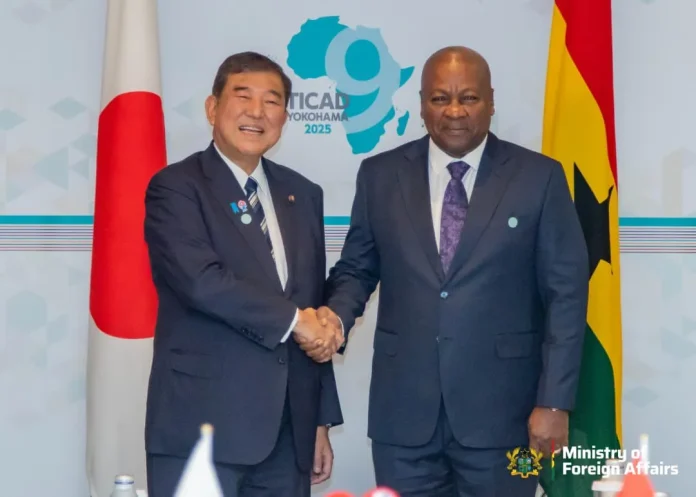President John Mahama’s recent participation in Tokyo’s Africa development conference has yielded multiple agreements covering infrastructure, automotive manufacturing, and agricultural development, according to Ghana’s Foreign Minister.
Samuel Okudzeto Ablakwa described the outcomes from the Ninth Tokyo International Conference on African Development as transformative for Ghana’s economic trajectory. The Foreign Minister, who also serves as North Tongu MP, outlined the agreements in a detailed social media update following the presidential visit.
The most notable infrastructure commitment involves reviving the stalled Volivo to Dorfor Adidome Bridge project spanning the Volta River. Both governments have pledged additional funding to accelerate construction of the crossing, which has faced delays for several years. Officials also confirmed that Kumasi’s inner-city ring road development will proceed under the new arrangements.
Toyota has agreed to expand its Ghana operations significantly, with plans to establish the country as its West African regional headquarters. The automotive partnership represents a major industrial development for Ghana’s manufacturing sector and could influence the broader regional automotive market.
Ghana secured what officials termed a “groundbreaking space agreement” designed to harness space technology for national development purposes. Details of specific applications or timeline for implementation were not immediately provided.
Youth development features prominently in the bilateral arrangements, with Japan committing to train approximately 300,000 young Ghanaians across multiple sectors. The training programs will focus on artificial intelligence, modern agricultural techniques, green technology transitions, technology entrepreneurship, and biotechnology applications.
Agricultural cooperation received particular attention through a specialized framework targeting rice production enhancement. The initiative aims to boost food security through advanced scientific research and improved farming methods.
Financial commitments include US$100 million allocated specifically for new agricultural projects. Ghana has also established what officials describe as a strategic industrialization partnership, though specific investment amounts were not disclosed for this component.
Japan is reportedly considering a dedicated US$1.5 billion short-term investment program for Africa, with Ghana positioned as a potential beneficiary. The investment timeline and sector focus remain under discussion between the two governments.
Ablakwa highlighted President Mahama’s conference leadership role, noting his participation in chairing plenary sessions while presenting Ghana’s development vision. The Foreign Minister characterized the diplomatic engagement as elevating bilateral relations to unprecedented levels.
The partnership builds on nearly a century of Ghana-Japan connections, dating back to Dr. Hideyo Noguchi’s yellow fever research in Ghana. The Japanese scientist died in Ghana during his medical research, establishing an early link between the two nations that continues to influence diplomatic relations.
Source: newsghana.com.gh











